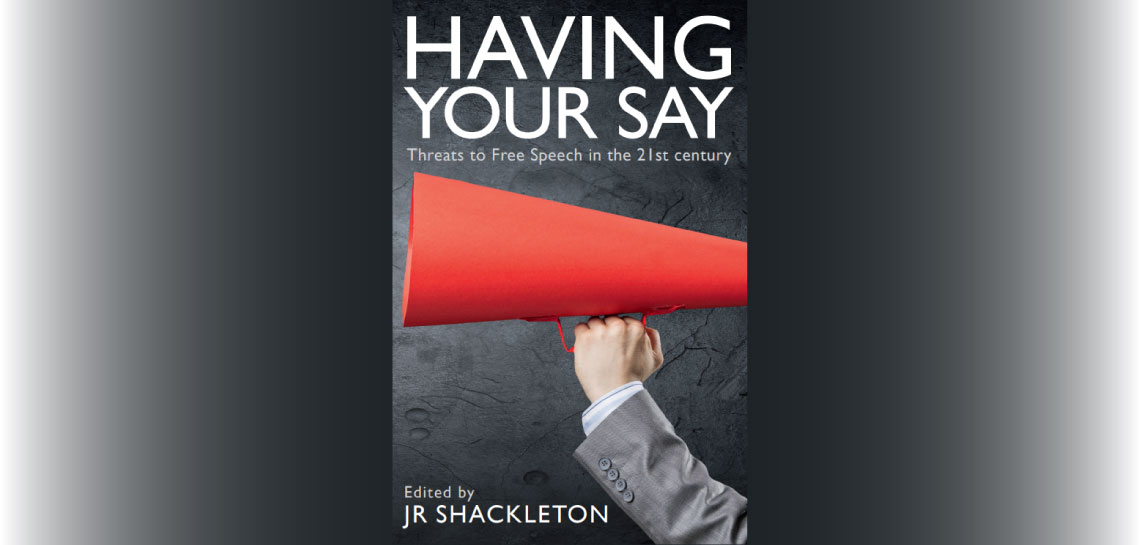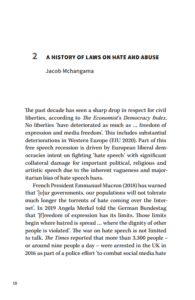
Justitia’s executive director Jacob Mchangama has contributed with a chapter to the book “Threats to free speech in the 21st century”
Read the the chapter:
About the book:
SUMMARY
- Free speech is, with free trade, freedom of enterprise and security of property, one of the key features of classical liberalism. It is currently being undermined, for a variety of plausible reasons, by government, social and mainstream media companies, and the behaviour of individuals, firms and non-profit organisations.
- Having thrown off the obvious shackles on free speech in the 1960s and 1970s, we are now imposing new forms of restriction on freedom of thought and expression. Young people in particular are being socialised into a censoriousness about dissident behaviour and speech which is reminiscent of totalitarian regimes.
- One reason for suppressing free speech is concern with ‘hate crimes’. But speech bans have a long history, which shows that, whatever the intent, they are often more likely to hurt disadvantaged groups than protect them. Recent restrictions on speech in western Europe, for example, have been copied to sinister purpose by oppressive governments.
- Political extremism is more widespread, but less dangerous, than is often supposed by mainstream politicians and commentators. The way to tackle it is by intelligent policing to restrict opportunities for violence rather than by blanket bans on freedom of expression.
- The presence of disturbing online content is leading governments towards increasing regulation of social media and Internet hosts. But the attempt to eliminate disinformation and harm from the Internet is likely to be doomed to failure. Recent legislative proposals will not achieve what they are intended to achieve, but may cause innovation and competition to suffer.
- Free speech is considered by both right and left as negotiable or even dispensable when faced with issues such as Covid-19 or Black Lives Matter. In such circumstances our political elites pursue a particular narrative through mainstream and social media and effectively ‘cancel’ those who express opposition or even mild doubt.
- The prevailing mood of political correctness inhibits comedians and makes people ashamed of what they or their parents used to laugh at in the past. While the consensus may be that there have to be some externally imposed limits on comedic speech, we can’t assume that those who police this speech will act reasonably. A healthy society needs to be able to laugh at itself, even if it occasionally hurts.
- A neglected area of concern is ‘commercial free speech’ – what advertisers can and can’t say. UK advertising is widely praised worldwide, and a major export earner. But it is increasingly restricted both by government bans and by the Advertising Standards Authority, an unrepresentative body which promotes a form of social engineering and has called for the regulation of political speech.
- Some aspects of religious freedom are under threat. Public Space Protection Orders and Community Protection Notices have been activated against Christian activists handing out leaflets and holding placards or even silently praying in anti-abortion demonstrations. Proselytising Christians have also been investigated for alleged hate crimes, while some people have lost their jobs for asserting Christian values. Muslims are also particularly at risk from anti-extremist policies.
- Universities, like other organisations, have the right to prohibit certain types of expression and behaviour from their premises, and impose contractual obligations on employees. However, recent challenges to free speech in higher education, often driven by radical students demanding suppression of ideas, ‘no platforming’ and sanctions against or dismissal of staff, are a worrying phenomenon. A major part of the problem is the lack of institutional diversity in higher education.
- Trade unions, in the past among the fiercest proponents of free speech, have moved away from this and instead focus on a ‘therapeutic’ role which requires them to protect members from speech that is felt to threaten harm or vaguely defined ‘offence’.
- ‘Offence’ has indeed been too widely accepted as a reason for speech restrictions. People may feel offended without being offended in a significant way, and even those being offended may suffer no meaningful harm. And while people can be compensated for harm from free speech, there is no way of compensating people for removing the freedom to speak. In any case, on purely pragmatic grounds it is nearly always best to allow serious disagreements to be vigorously debated rather than
Access the full book here.
Jacob Mchangama is the Founder and Executive Director of The Future of Free Speech. He is also a research professor at Vanderbilt University and a Senior Fellow at The Foundation for Individual Rights and Expression (FIRE).


